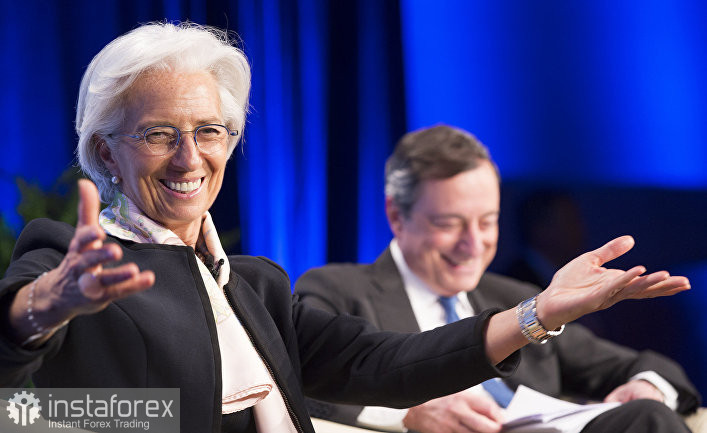The euro continued its fall after Christine Lagarde avoided during her speech in London answering whether the European Central Bank would be raising or maintaining interest rates. It's evident that the ECB is keeping everyone on edge regarding one of its most uncertain decisions in its long-standing battle against inflation. The suspense is weighing on the European currency against the US dollar, especially when other major central banks seem to be on a clear track.

"Actions speak louder than words," Lagarde declared at a seminar in London, organized by the European Economic and Financial Center. "We've raised our interest rates by a total of 425 basis points in 12 months — a record pace in record time. And we will achieve a timely return of inflation to our medium-term target of 2%."
How the market should interpret these statements remains a mystery. It's clear that at the meeting on September 14, ECB policymakers will fully assess whether the recent economic slowdown is enough to justify the first pause in the monetary tightening cycle that began over a year ago. At the previous meeting in July, Lagarde stated that policymakers could both raise and maintain the rate, as they increasingly focus on the data that will determine their actions. However, last week's eurozone inflation data showed that the closely watched core CPI slipped to 5.3% in August from 5.5% in the previous month. However, overall inflation remained unchanged at the same level of 5.3%, which officials did not expect. Policymakers also clearly see signs that the downturn in the private sector has escalated. As a result, the composite PMI which covers both sectors contracted in August.
Currently, markets estimate roughly one to four odds that the ECB will raise the refi rate by a quarter percentage point to 4% next week. For comparison, the probability was about 60% before economic data showed that core inflation in the eurozone had slowed.
As for other ECB policymakers, opinions have also been divided. Isabel Schnabel, an Executive Board member responsible for markets, said last week that while inflation is still high, growth prospects are worse than officials predicted in June.
Speaking earlier on Monday, Portugal's Governing Council member, Mario Centeno, said there's a risk of raising interest rates too high as the economy adjusts to new financial conditions.
Other officials, including Executive Board members Fabio Panetta and Frank Elderson, refrained from discussing the upcoming decision. However, Bundesbank President Joachim Nagel, usually one of the ECB's "hawks", hinted he would advocate for a rate hike. "We must be ready to do more," he said. "The financial system shouldn't take it for granted that this is the end. We also need to address the issues with excess liquidity."
Regarding today's technical picture for EUR/USD, the bulls continue to face challenges. To regain control, the buyers need to stay above 1.0705, which will be quite problematic. Only then, there will be a chance to break back towards 1.0750. From this level, the instrument may climb to 1.0775, but doing so without support from major players will be quite challenging. In case of a decline in the trading instrument, I expect any significant action from large buyers only around 1.0705. If no one shows up there, it would be wise to wait until the 1.0670 low is updated or open long positions from 1.0640.
As for the technical picture of GBP/USD, the instrument remains under pressure. GBP may strengthen only if the bulls gain control over the 1.2585 level. Taking out this level would revive hopes for a recovery towards 1.2630. Once it happens, we could talk about a more substantial GBP rally towards 1.2770. If the pair falls, the bears will attempt to seize control over 1.2530. If they succeed, breaking this range will hurt the bulls' positions and push GBP/USD down to a low of 1.2480 with prospects of a drop to 1.2440.
 English
English 
 Русский
Русский Bahasa Indonesia
Bahasa Indonesia Bahasa Malay
Bahasa Malay ไทย
ไทย Español
Español Deutsch
Deutsch Български
Български Français
Français Tiếng Việt
Tiếng Việt 中文
中文 বাংলা
বাংলা हिन्दी
हिन्दी Čeština
Čeština Українська
Українська Română
Română

